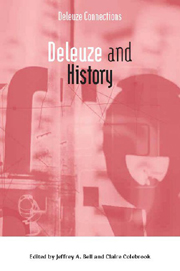Book contents
- Frontmatter
- Contents
- Introduction
- 1 Events, Becoming and History
- 2 Of the Rise and Progress of Philosophical Concepts: Deleuze's Humean Historiography
- 3 Theory of Delay in Balibar, Freud and Deleuze: Décalage, Nachträglichkeit, Retard
- 4 Geohistory and Hydro-Bio-Politics
- 5 The Thought of History in Benjamin and Deleuze
- 6 The Cannibal Within: White Men and the Embodiment of Evolutionary Time
- 7 Ageing, Perpetual Perishing and the Event as Pure Novelty: Péguy, Whitehead and Deleuze on Time and History
- 8 Cinema, Chronos/Cronos: Becoming an Accomplice to the Impasse of History
- 9 Deleuze's Untimely: Uses and Abuses in the Appropriation of Nietzsche
- 10 Is Anti-Oedipus a May '68 book?
- 11 Molar Entities and Molecular Populations in Human History
- Notes on Contributors
- Index
11 - Molar Entities and Molecular Populations in Human History
Published online by Cambridge University Press: 12 September 2012
- Frontmatter
- Contents
- Introduction
- 1 Events, Becoming and History
- 2 Of the Rise and Progress of Philosophical Concepts: Deleuze's Humean Historiography
- 3 Theory of Delay in Balibar, Freud and Deleuze: Décalage, Nachträglichkeit, Retard
- 4 Geohistory and Hydro-Bio-Politics
- 5 The Thought of History in Benjamin and Deleuze
- 6 The Cannibal Within: White Men and the Embodiment of Evolutionary Time
- 7 Ageing, Perpetual Perishing and the Event as Pure Novelty: Péguy, Whitehead and Deleuze on Time and History
- 8 Cinema, Chronos/Cronos: Becoming an Accomplice to the Impasse of History
- 9 Deleuze's Untimely: Uses and Abuses in the Appropriation of Nietzsche
- 10 Is Anti-Oedipus a May '68 book?
- 11 Molar Entities and Molecular Populations in Human History
- Notes on Contributors
- Index
Summary
We no longer believe in a primordial totality that once existed, or in a final totality that awaits us at some future date. We no longer believe in the dull gray outlines of a dreary, colorless dialectic of evolution, aimed at forming a harmonious whole out of heterogeneous bits by rounding off their rough edges. We believe only in totalities that are peripheral. And if we discover such a totality alongside various separate parts, it is a whole of these particular parts but does not totalise them; it is a unity of all those particular parts but does not unify them; rather it is added to them as a new part fabricated separately.
Gilles Deleuze and Félix Guattari, Anti-OedipusA crucial question confronting any serious attempt to think about human history is the nature of the historical actors that are considered legitimate in a given philosophy. One can, of course, include only human persons as actors, either as rational choosers (as in microeconomics) or as phenomenological subjects (as in micro-sociology). But if we wish to go beyond this we need a proper conceptualisation of social wholes. The very first step in this task is, clearly, to devise a means to block microreductionism, a step usually achieved by the concept of emergent properties, properties of a whole that are more than the sum of the properties of its parts.
- Type
- Chapter
- Information
- Deleuze and History , pp. 225 - 236Publisher: Edinburgh University PressPrint publication year: 2009



